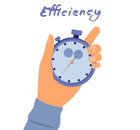13 Best Books for Scrum Masters
Scrum Master is the leader, coach, and facilitator that empowers the team to deliver quality work and ensure a collaborative culture. So, how to become the ideal Scrum Master your team wants? The list of books in this article will provide the roadmap to follow.

The role of Scrum Master looks simpler than the traditional project manager. But deep inside, Scrum Masters have many crucial duties to fulfill. They are the ones that empower the development team to follow the Scrum framework, remove roadblocks or distractions, facilitate communication, and do a lot more. Although the gradual experience with Scrum will help Scrum Masters improve their skills, reading a few books can accelerate their mastery of the Scrum Master role. Therefore, we have shortlisted a few best books for Scrum Masters that can help them set solid roots in this role. So, let's get started!
There are dozens of books that talk about Agile, Scrum, Scrum Master roles, project/team management, and similar other aspects. However, we have picked the most relevant books for Scrum Masters that will greatly help them in this journey. We are dividing the books into seven categories, starting from understanding the Scrum basics to ending with the complex duties of the Scrum Master.
1. Clearing the Concepts & Popularity of Scrum
Before understanding the basics and the role of the Scrum Master, it is important to be clear with the concepts of Scrum. So, below are two books that can help you understand the concepts and popularity of Scrum:
Book #1: Scrum: The Art of Doing Twice the Work in Half the Time, Jeff Sutherland
The writer of this book, Jeff Sutherland, is the co-founder of the Scrum framework. This book provides a detailed look at the origin of Scrum, how it was created, and its main principles that reflect its effectiveness. You also get to understand how Scrum is game-changing in project management with real-world examples.
Book #2: Scrum: The Ultimate Beginner's Guide To Learn And Master Scrum Agile Framework, Hein Smith
This book is another basic-level guide about Scrum, discussing its history, basics, and key components. Moreover, it also helps you understand the reasons behind the rising popularity of Scrum and the problem it solves.
2. Where does Scrum stand in Agile? Why choose Scrum, not Agile?
Scrum and Agile are two confusing concepts for many. Often, they are used interchangeably, leading to misconceptions. So, it is vital to be clear about Scrum and Agile. For that, the below two books are resourceful:
Book #1: Learning Agile: Understanding Scrum, XP, Lean, and Kanban, Andrew Stellman & Jennifer Greene
This book provides a comprehensive overview of the popular Agile frameworks, helping readers distinguish between Agile and the different frameworks. The writers have tried to explain everything with a "Why". The section about Scrum provides a proper overview, including examples, exercises, and other details. Besides Scrum, you also get to learn about XP, Kanban, and Lean. This way, you can understand the distinguishing elements between Scrum and other frameworks.
Book #2: Succeeding with Agile: Software Development Using Scrum, Mike Cohn
This book provides a comprehensive look at Agile-based software development. It highlights all the roles, structure, approaches, and principles, especially talking about the Scrum framework. So, this book will help you better understand Scrum and Agile and how to proceed with Scrum-based projects while deploying Agile concepts.
3. Understanding the Basics of the Scrum Master Role
After clearing the concepts of Scrum and Agile, you can start reading books specific to the Scrum Master role. To clear the basic concepts, below are two suggested books you should read:
Book #1: The Great ScrumMaster: #ScrumMasterWay, Zuzana Šochová
This book is a perfect starting point for Scrum Masters. It provides detailed and organized information about the role of the Scrum Master. You get to learn about core responsibilities and other role-specific things, like coaching, facilitation, conflict resolution, continuous improvement, etc. It also includes insightful examples of various situations that Scrum Masters have to tackle. Overall, it is an excellent book to improve your skills as a Scrum Master.
Book #2: Certified ScrumMaster (CSM) 83 Success Secrets, Janice Garrison
If you want to clear your basics about Scrum Master in an engaging and reader-friendly way, this book covers it effectively. In 72 pages, it provides 83 comprehensive answers with detailed explanations, insights, and references.
4. Continuous Improvement Importance & In Practice
Scrum is all about continuous improvement, where the team continuously looks for ways to optimize their operations. Scrum Master is a major facilitator in encouraging the continuous improvement culture in the team. So, the below book can help you improve in this domain:
Book #1: Agile Retrospectives: Making Good Teams Great, Esther Derby & Diana Larsen
Retrospective is the last event in the sprint and the key to driving an improvement culture. It is where the team examines its operational efficiency and bottlenecks and sets action plans for future improvements. Therefore, this book talks about the tips, tools, and tricks to drive continuous improvement through the concept of Agile retrospectives.
5. How to Coach the Team
Coaching the development team is one of the core duties of Scrum Masters. There are many situations where the team needs someone to coach them and take them out of situations effectively, such as resistance to change, conflicts, lack of collaboration, biases, etc.
For instance, a team uses Planning Poker or Async Poker technique to estimate product backlog items but struggles to reach a consensus for a few items. Therefore, Scrum Masters should be capable of managing such situations effectively. So, the below book can be of immense help to mastering the coaching skills:
Book #1: Coaching Agile Teams: A Companion for ScrumMasters, Agile Coaches, and Project Managers in Transition, Lyssa Adkins
This book covers all aspects of how to coach the Agile team, whether you are working as a Scrum Master, Agile coach, or project manager. It covers the basics of what it takes to become a top-notch agile coach, helps you master the coaching role, guides you on creating an environment of self-organization, and many more.
6. Play the Role of a Leader/Facilitator Your Team Needs
Since Scrum Masters are not project managers, they are considered the leader/facilitator who will rescue the team in all matters. So, they should showcase the excellent leadership skills the team expects from them. So, the below books can help uplift leadership skills:
Book #1: Scrum Mastery: From Good To Great Servant-Leadership, Geoff Watts
This book is an all-in-one resourceful guide for Scrum Masters to become the best leaders/facilitators. Watts excellently covers the lessons it learned working with different teams. It first covers fundamentals and then leads to more advanced topics, such as coaching techniques, conflict resolution, etc. So, whether you are a beginner or an experienced Scrum Master looking to set up a strong leadership presence, this book is highly recommended.
Book #2: The Coaching Habit: Say Less, Ask More & Change the Way You Lead Forever, Michael Bungay Stanier
This book is all about how to become an influential coach or leader. Although it is not specifically talking about Scrum Masters, still the coaching techniques and principles it covers can help you uplift your skills as the leader/facilitator/coach your team needs.
7. Contribute to Product Success
Scrum Masters also play their role in contributing to the product's success. For instance, they help Product Owners in product backlog-related matters, ensure transparent communication between the team and stakeholders, etc. Therefore, the below three books are useful for Scrum Masters to improve their contribution to product success:

Async Poker for Jira

Sync Poker for Jira
Book #1: User Story Mapping: Discover the Whole Story, Build the Right Product, Jeff Patton
This book talks in detail about user story mapping, which is a common technique used to understand the bigger picture of the project from the user's perspective. This book will help you understand how to deploy the user story mapping technique effectively and use it to collaborate with Product Owner to craft a well-structured product backlog.
Book #2: The Lean Product Playbook: How to Innovate with Minimum Viable Products and Rapid Customer Feedback, Dan Olsen
This book provides resourceful information on Minimum Viable Product (MVP) and how it leads to creating products that customers need. So, you can learn a lot about iterative development and rapid customer feedback, which is the key to product success in Scrum.
Book #3: Value Proposition Design: How to Create Products and Services Customers Want, Alex Osterwalder, Yves Pigneur, Gregory Bernarda, & Alan Smith
This book considers one of the main issues organizations face, i.e., creating products and services that customers want. Its visual format and detailed explanation of processes and tools can help teams deliver products that sell. Therefore, this book is valuable for you to master the art of creating customer-centric products.
Wrapping Up
Scrum Masters have a crucial role to play in Scrum-based projects. They ensure that the team follows the Scrum principles and best practices and set an environment of self-organization, continuous improvement, and effective collaboration. Therefore, it is crucial for Scrum Masters to be the master of their role. The above books will significantly help Scrum Masters at any level of their career to clear out the basics thoroughly and then improve their outcomes with gradual experience. Every role requires both training and experience to succeed, and so does the role of a Scrum Master.




